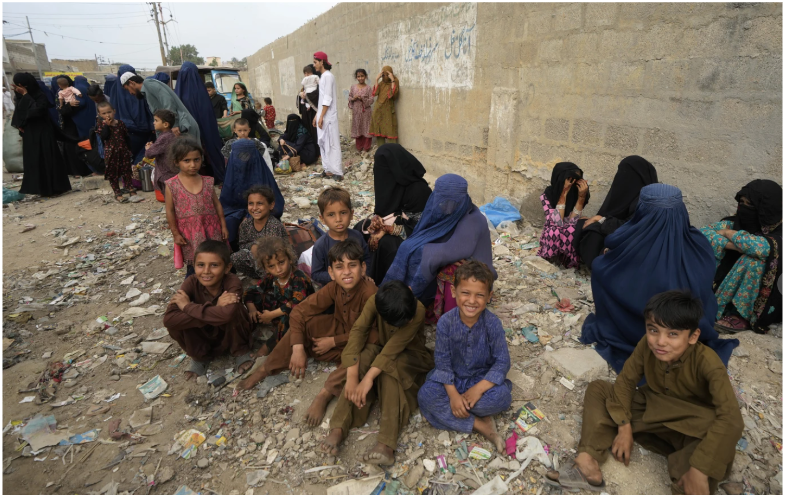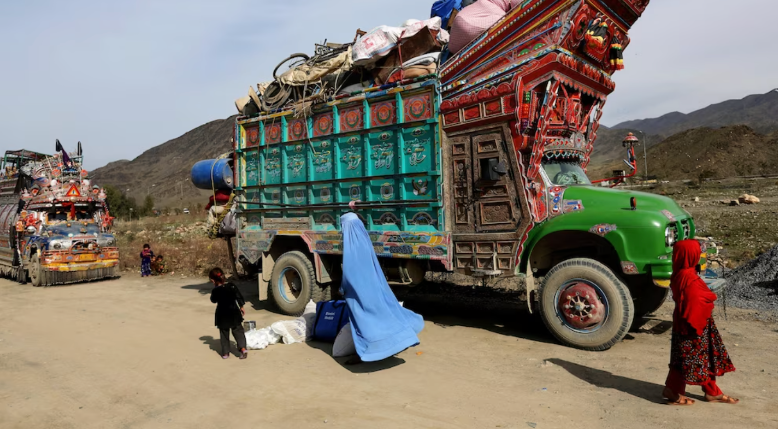Pakistani Government Creating Stringent Requirements for Afghan Refugees
Afghan families wait to board into a bus to depart for their homeland, in Karachi, Pakistan. Friday October 6th 2023. AP Photo/Fareed Khan.
On October 3, the Pakistani government announced that all unregistered Afghan refugees will be forced to leave the country by November 2023. Specifically, Pakistan’s Interior Minister Sarfraz Bugti announced the crackdown order on “illegal immigrants”. During recent global conflicts, many Afghans fled home in fear of prosecution following the Taliban takeover of Afghanistan in August 2021. Since then, many fled to Pakistan in search for an improved quality of life and safety.
However, the Afghan refugee situation in Pakistan has been tumultuous from the start, through waves of arbitrary arrests, threats of deportation, and detentions that are a constant threat to their daily lives. Delays in the approval process for their Proof of Registration (PoR) or Afghan Citizen Card (ACC) have resulted in numerous refugees lacking the identity documents needed for them to remain regularly in Pakistan. Initially, upon arrival to Pakistan, many Afghan refugees entered the country with normal visas, which since expired.
The United Nations High Commissioner for Refugees (UNHCR) emphasizes a non-return advisory for Afghans who currently reside outside of their home country, after the Taliaban takeover. The UNHCR estimates that over 3.7 million Afghans reside in Pakistan, of which only 1.4 million are formally registered. Pakistan’s mandate to deport undocumented Afghan refugees by November is condemned by organizations such as Amnesty International, who view such actions as a violation of fundamental human rights given the economic and political vulnerability in Afghanistan.
The Pakistani campaign to expel undocumented Afghan migrants stems from strained relations between Pakistan and Afghanistan. The Pakistani government reported that Pakistan faced attacks perpetrated by Taliban-allied militants who continually cross the 2,611 kilometer (1,622 mile) border shared between the two countries.
An Afghan refugee family returns to Afghanistan through Pakistan's border crossing, Torkham, east of Kabul, Afghanistan on March 11, 2015. AP Photo/Rahmat Gul, File.
Bugti announced that any migrants residing in Pakistan illegally should return back to their home countries voluntarily before the month of October comes to an end to avoid forced deportations and mass arrests. Additionally, Bugti claimed that the Pakistani government plans to confiscate assets and property belonging to illegal migrants if they choose to remain in Pakistan. The implementation of stringent government measures are in place to catch illegal immigrants, such as phone lines to offer rewards to individuals in Pakistan who share knowledge to authorities about undocumented migrant activities.
The Chief Spokesman for the Taliban government, Zabihullah Mujahid stated, “Afghan refugees are not involved in Pakistan’s security problems. As long as they leave Pakistan voluntarily, that country should tolerate them”. Afghan refugees living in Pakistan grew accustomed to marginalization and the instability of their living situation. Yet, this is the first time that the Pakistani government announced a rigid crackdown and drop threat on illegal immigration.
Amnesty International urges the government of Pakistan to continue its historic support for Afghan refugees as a means of providing them with the opportunity of living with dignity and freedom. The fear of deportation to Afghan refugees is grave because they face threats of persecution by the Taliban. The UNHCR is working towards expediting the registration and reviews of applications from Afghans seeking international protection and asylum in Pakistan.
For years, Pakistan has been a place of security for displaced Afghan refugees dating back to the era of Soviet occupation from 1979-1989, creating one of the world’s biggest refugee populations. The United Nations fears the myriad of human rights violations associated with the Pakistani government’s latest crackdown on Afghan refugees.


